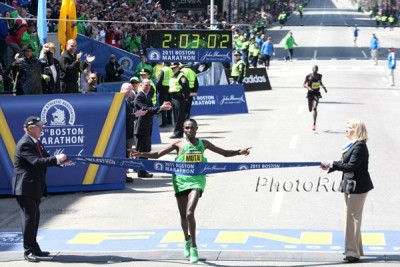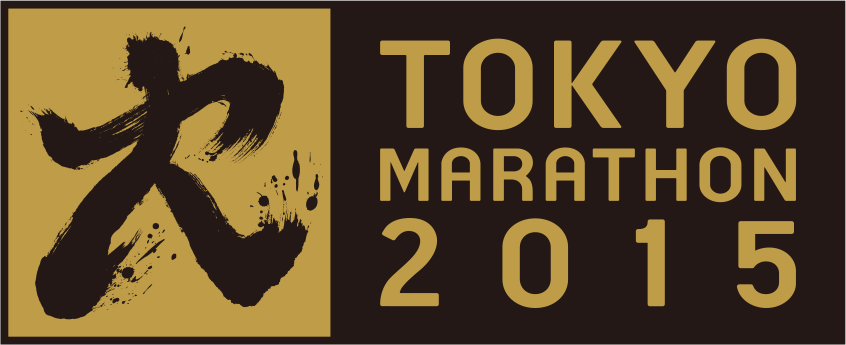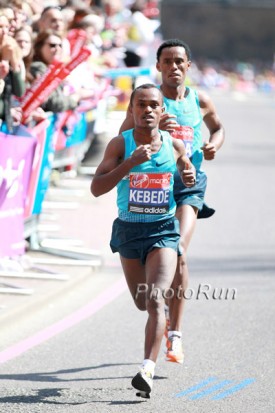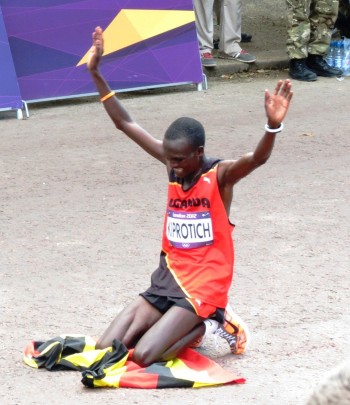2015 Tokyo Marathon Men’s Preview: Dickson Chumba Aims to Repeat vs. Geoffrey Mutai, Stephen Kiprotich & Tsegaye Kebede
By Jonathan Gault
February 20, 2015
Editor’s update at 10:15 am ET: LetsRun.com has learned that Geoffrey Mutai is not running due to injury: MB: Breaking News. Geoffrey Mutai is out of 2015 Tokyo Marathon. This hasn’t been announced yet by race organizers but he’s not racing so ignore what you read about him below.
The 2015 Abbott World Marathon Majors season will kick off on Sunday with the ninth annual Tokyo Marathon (or 36th, if you go back to the Tokyo International Marathon days). Spring marathon season doesn’t get in full swing until April, but Tokyo has enough talent that it should whet the appetite of marathon-starved fans for a little while until the bigger boys of Boston and London take center stage.
On the men’s side, defending champion Dickson Chumba, who set the course record of 2:05:42 last year, will take on multi-major winners Tsegaye Kebede (2010/2013 London, 2012 Chicago) and Geoffrey Mutai (2011/13 New York, 2011 Boston, 2012 Berlin) as well as 2012 Olympic/2013 World champion Stephen Kiprotich of Uganda. The field also contains sub-2:05 men Endeshaw Negesse and Markos Geneti of Ethiopia and will feature the debut of 2012 Olympic 10,000 bronze medalist Tariku Bekele, brother of the legendary Kenenisa.
A year ago a Mutai (2013 NY champ), Kebede (2013 London champ), Kiprotich (2013 World Champ) match-up would have been almost as good as it gets in marathoning. Now all 3 titans have something to prove against Chumba.
While this year’s top-end quality in Tokyo isn’t close to London, it’s arguably on par with (or perhaps better than) Boston this year. What sets Tokyo apart is its depth. As Japan Running News’ Brett Larner reports, “All told Tokyo features 21 men with bests from 2:03:02 to 2:09:30, the other spring World Marathon Majors Boston having 15 men from 2:03:38 to 2:09:37 and London 13 from 2:02:57 to 2:09:54.”
Read on for the details on Sunday’s races and a breakdown of the top men’s contenders.
What: 2015 Tokyo Marathon
When: Sunday, 9:10 a.m. Japan Standard Time (7:10 p.m. Saturday night ET)
Where: Tokyo, Japan
How to watch: Live on Universal Sports TV Network or online at UniversalSports.com starting at 7 pm ET.
Prize money
Unlike most major marathons, Tokyo has nothing about prize money on its website. All it says is “for the marathon race, prize money based on the results will be awarded in accordance with separate rules.”
Abbott World Marathon Majors
Since its inception in 2006, the World Marathon Majors crowned champions in two-year cycles, with the male and female winner each taking home $500,000. Yesterday, organizers announced that, while the $500,000 prizes will remain the same, the format will change to a one-year cycle. The WMM races remain the same (Tokyo, Boston, London, Berlin, Chicago and New York plus the World Championship/Olympic marathons).
Here’s how the new system works.
Each cycle will begin and end with the same race. So the first cycle under the new format — known as AWMM Series IX — will begin with the 2015 Tokyo Marathon on Sunday and conclude with the 2016 Tokyo Marathon. AWMM Series X will begin with the 2016 Boston Marathon (the next race on the calendar after Tokyo) and conclude with the 2017 Boston Marathon, and so on.
The points system has also been tweaked. Instead of 25-15-10-5-1 for 1st through 5th, the new system is 25-16-9-4-1. So 2nds are slightly more valuable, 3rds and 4ths are slightly less valuable and 1sts and 5ths remain the same. Additionally, runners can only score points in a maximum of two races per cycle, so the most points anyone can finish with is 50. If two runners are tied atop the standings, the first tiebreaker is head-to-head record in WMM races and the second tiebreaker is total victories. The third tiebreaker comes down to which athlete the WMM race directors determine to be the champion, though they also have the right to award the title jointly (that seems like the only fair thing to do if there’s a scenario where one runner wins Boston and New York and another wins London and Chicago).
Finally, the WMM announced beefed-up drug testing will go into effect from this point forward and that, in cooperation with the IAAF, it will “create a pool of championship-eligible runners who will undergo additional out-of-competition drug testing” with full details to be announced later. The $500,000 prize will also be awarded over the course of five years, $100,000 at a time “to take advantage of long-term biological mapping of athletes.” In the past, the prize was awarded in a lump sum. Clearly, the WMM doesn’t want another doper like Liliya Shobukhova or Rita Jeptoo stealing money from a clean athlete.
| Athlete | Country | PB | Comment |
| Geoffrey Mutai | Kenya | 2:03:02 | 4-time major champ was 6th in London+NYC last year |
| Tsegaye Kebede | Ethiopia | 2:04:38 | Mr. Consistent coming off rare bad race (9th in Berlin in 2:10:27) |
| Stephen Kiprotich | Uganda | 2:07:20 | Olympic/World champ has fared poorly in non-championship marathons (12th London, 5th NYC in ’14) |
| Dickson Chumba | Kenya | 2:04:32 | Set CR (2:05:42) last year, then set PB to take 3rd in Chicago |
| Endeshaw Negesse | Ethiopia | 2:04:52 | Set PB at 2013 Dubai; hasn’t come within 3:40 of that time in 4 other marathons |
| Markos Geneti | Ethiopia | 2:04:54 | 2nd in Dubai last year, then 5th in Boston |
| Peter Some | Kenya | 2:05:38 | 5th last year but just 6th in Toronto Marathon in October |
| Shumi Dechasa | Bahrain | 2:06:43 | Ethiopian-born runner coming off victory in Hamburg in May |
| Michael Kipyego | Kenya | 2:06:48 | 2012 champ was 4th last year, but just 17th in NYC |
| Yared Asmerom | Eritrea | 2:07:27 | 4th at ’07 WC; has DNF’ed three of last four marathons |
| Adil Annani | Morocco | 2:07:43 | 4th at 2012 London; 10th in Boston last year |
| Josphat Boit | USA | 2:12:52 | 11th in Boston last year after breaking away w/Meb; just 28th at last month’s US Half Champs (63:53) |
| Tariku Bekele | Ethiopia | Debut | ’12 Olympic 10k bronze medalist (12:52/27:03 pbs) makes marathon debut |
| Arata Fujiwara | Japan | 2:07:48 | Just 76th last year; hasn’t run a good marathon in 2+ years |
| Joseph Gitau | Kenya | 2:06:58 | Japan-based Kenyan was 16th in Fukuoka in December (2:15) |
| Kohei Matsumura | Japan | 2:08:09 | Asian Games silver medalist was 8th last year (top Japanese finisher) |
| Ryo Yamamoto | Japan | 2:08:44 | 13th in Berlin last fall; 63:29 half on January 18 |
| Koji Kobayashi | Japan | 2:08:51 | 9th last year; 10th in Chicago in October |
| Hirokatsu Kurosaki | Japan | 2:09:07 | 11th last year; 63:46 half on February 1 |
| Masanori Sakai | Japan | 2:09:10 | 12th last year; 4th in Sapporo in August (2:17) |
| Masato Imai | Japan | 2:09:30 | Modest pb but has finished 6th + 7th in NYC last two years |
| Yuki Sato | Japan | 2:16:31 | Track pbs of 13:13/27:38 but just 2:16:31 (31st) last year in debut |
The Man to Beat
Dickson Chumba — Kenya, 28 years old, 2:04:32 pb (2014 Chicago), 60:39 half
Last two marathons: 3rd 2014 Chicago (2:04:32), 1st 2014 Tokyo (2:05:42 CR)
Chumba wasn’t a total unknown this time last year — he claimed victories in Rome in 2011 (2:08:45) and Eindhoven in 2012 (2:05:46) — but 2014 was the year he really broke out. The 28-year-old Kenyan took down Dennis Kimetto‘s course record in Tokyo in February (when Kimetto set the old record of 2:06:50 in 2013, he ran 2:03:45 to set the CR in Chicago eight months later) and proved that performance was no fluke by chopping another 1:10 off his pb to finish third in Chicago in October. Those performances were good enough to put him at No. 6 in our 2014 men’s marathon rankings.
Chumba has the second-fastest pb in the field, and he’s been in better form recently than the guy with the fastest pb (Mutai). Perhaps the biggest thing working in Chumba’s favor, however, is his age. In the past few years, many of the world’s very best marathoners — the guys winning multiple majors — have been in their late-20s or early-30s. Take a look at the world’s top three marathoners right now — as well as Mutai, who was one of, if not the best marathoner on the planet from 2011 to 2013 — and a pattern emerges.
| Athlete | Breakthrough marathon | Age at the time |
| Dennis Kimetto | 2012 Berlin (2nd, 2:04:16) | 28 |
| Wilson Kipsang | 2010 Frankfurt (1st, 2:04:57) | 28 |
| Eliud Kipchoge | 2012 Hamburg (1st, 2:05:30) | 28 |
| Geoffrey Mutai | 2010 Eindhoven (2nd, 2:04:55) | 28 |
In each case, that number in the far-right column, “age at the time,” is the same: 28. And guess how old Chumba is right now? Yup, 28 years old.
You can split hairs a little here and argue about what Chumba’s breakthrough race was (either his 2012 win in Amsterdam or 2014 CR in Tokyo) or the fact that Chumba turned 28 in late October, meaning that he was 27 during his breakthrough 2014 season. But the larger point is that each of the guys in the table above immediately put together a stretch of dominance after turning 28 years old. There are some fantastic young marathoners out there, for sure — Lelisa Desisa is still just 25 — but most of the super-elite guys are older. Of the top 12 fastest (legal) times ever run, just one — Patrick Makau‘s 2:03:38 in Berlin in 2011 — came from a man younger than 28. Of LetsRun’s top 10 marathoners last year, just one was younger than 28; their average age was 29.8.
All of this means that Chumba is in his prime right now and, if recent history is any guide, has a chance to get even better over the next few years. He hung with Kipchoge through 24 miles in Chicago last fall; if he goes back-to-back in Tokyo, Chumba will have to be considered a serious threat to win whatever fall marathon he enters.
Still Capable of Greatness
Tsegaye Kebede — Ethiopia, 28 years old, 2:04:38 pb (2012 Chicago), 59:35 half
Last two marathons: 9th 2014 Berlin (2:10:27), 3rd 2014 London (2:06:30)
While most Americans would be overjoyed with a 2:10:27 marathon (since the 2012 Olympic Trials, just two Americans — Dathan Ritzenhein and Meb Keflezighi — have bettered that time), you can make the case that Kebede’s 2:10:27 in New York was the worst of the 18 marathons he’s completed in his career. At best, it ranks no higher than 17th (it was his lowest place ever and second-slowest time).
Kebede is still only 28, and while he’s been marathoning long enough that he’s unlikely to see huge breakthroughs like the athletes listed in the previous section, he’s young enough that he should have several quality marathons left in him. Perhaps the grind of racing 18 marathons in eight years will mean that Kebede starts to slow earlier than runners who turned to the marathon at a later age, but it will require more than one bad race for to write off one of the most consistent marathoners in history. This is still a guy who has finished in the top five in 16 of his career 18 marathons (14 of those in the top three) and has broken 2:07 in 10 of them.
 Mutai holds course records in Boston and New York; how will he fare in Tokyo?
Mutai holds course records in Boston and New York; how will he fare in Tokyo?*More 2011 Boston Marathon Photos
Geoffrey Mutai — Kenya, 33 years old, 2:03:02 pb (2011 Boston), 58:58 half
Last two marathons: 6th 2014 New York (2:13:44), 6th 2014 London (2:08:18)
Mutai didn’t have a bad year in 2014 — he won the NYC Half Marathon in March and ran 27:35 or better in two different 10k road races. But in the marathon, Mutai failed to win a race for just the second year since 2007 — and in the other instance, 2010, he put up two extremely fast runner-up finishes in Rotterdam (2:04:55) and Berlin (2:05:10). Last year, Mutai was sixth (albeit against a stacked field) in London, running 2:08:18, and finished in the same place in New York in 2:13:44 on a windy day. Neither of those performances are disasters, but given the brilliance we’ve come to expect from Mutai, it was jarring not to see him on at least one podium in 2014.
Because most marathoners race just twice per year, it’s hard to notice trends in any marathoner’s performance until they’ve actually happened. Mutai could definitely bounce back with a victory in Tokyo; after all, he’s just 15 months removed from his last major victory, in New York. But he’s also 33 years old. If Mutai isn’t in the top three on Sunday, he will have to accept that his career is on the decline. One thing to watch: how will Mutai respond if the pace goes fast? He hasn’t run better than 2:08:18 since his 2:04:15 victory in Berlin in September 2012.
Two More Sub-2:05 Guys
Markos Geneti — Ethiopia, 30 years old, 2:04:54 pb (2012 Dubai), 62:02 half
Last two marathons: 5th 2014 Boston (2:09:50), 2nd 2014 Dubai (2:05:13)
Geneti has run six marathons in his career, and there’s not a stinker in the bunch. Check them out below:
| Date | Location | Time | Place |
| 3/20/2011 | Los Angeles | 2:06:35 | 1st |
| 1/27/2012 | Dubai | 2:04:54 | 3rd |
| 12/9/2012 | Honolulu | 2:13:08 | 2nd |
| 4/15/2013 | Boston | 2:12:44 | 6th |
| 1/24/2014 | Dubai | 2:05:13 | 2nd |
| 4/21/2014 | Boston | 2:09:50 | 5th |
There’s something to be said for Geneti’s consistency, but he hasn’t improved much over the past few years. Yes, he ran 2:54 faster in Boston last year than he did in 2013 and moved from sixth to fifth, but Boston was a faster race in 2014 than it was in 2013 (winning time of 2:08:37 vs. 2:10:22) so if there was an improvement, it wasn’t massive. Ten years ago, a runner of Geneti’s caliber would seem like a near-lock to win at least one major. But with the competitiveness of the marathon right now, his future may be as a high-floor guy who’s consistently near the top in majors but not quite capable of the greatness it takes to win one. We’ll see if he can alter that path in Tokyo.
Endeshaw Negesse — Ethiopia, 26 years old, 2:04:52 pb (2013 Dubai), 63:32 half
Last two marathons: 4th 2014 Shanghai (2:09:47), 2nd 2014 Dusseldorf (2:08:32)
Negesse may look like an appealing pick given his 2:04:52 pb (fourth-best in the field), but he ran that time in Dubai, which means it must be taken with a grain of salt. In his four other marathons, none of them majors, he’s never run faster than 2:08:32, most recently placing fourth in Shanghai in November in 2:09:47. This race, his WMM debut, also represents a big step up in competition. Since Dubai (January 2013), he’s run two marathons, in Dusseldorf and Shanghai. This field isn’t London or New York, but it’s WAY better than what he’s used to facing. Perhaps that elevates his performance, as it did in Dubai. Or perhaps Negesse struggles. Of the five men in this field to have broken 2:05, he’s by far the least likely to win.
The Olympic Champ
Stephen Kiprotich — Uganda, 25 years old, 2:07:20 pb (2011 Enschede), 61:15 half
Last two marathons: 5th 2014 New York (2:13:25), 12th 2014 London (2:11:37)
For a man who has won Olympic and World Championship gold in the past three years, Kiprotich hasn’t fared particularly well in major marathons. Since claiming victory in London in 2012, he has finished sixth and 12th in London and, more surprisingly, just 12th and fifth on the more technical New York layout. I’d love to see what he’s capable of in Boston (his 2:07:20 pb is 1:48 faster than Meb Keflezighi‘s was when he won last year), but Kiprotich decided to change things up by going to Tokyo, a venue where he’s had success before. In 2012, he surprised himself by beating Haile Gebrselassie for third in this race, running his second-fastest time ever (2:07:50); six months later, he stunned the world and won Olympic gold.
Skipping London for Tokyo makes sense for Kiprotich, especially considering the ridiculous field London has put together this year. With eight sub-2:05 guys in London, Kiprotich would be unlikely to win that race, and even though Tokyo, like London, uses rabbits, Kiprotich has at least had success in Tokyo in the past.
I’d also love to know if finances had anything to do with Kiprotich’s choice of marathon. As the reigning Olympic/World champion, Kiprotich must command a good appearance fee, but I’d have to imagine his value has dropped in recent years as he’s struggled in major marathons. What’s it worth to London to have the Olympic champion in the field, even if they know he’s not going to contend for the win? Sadly, because marathon appearance fees are treated like state secrets, it’s not a question we’ll have an answer to anytime soon.
Kiprotich could certainly win this race, as his fifth in NYC last fall was his best performance in a non-championship marathon since his third in Tokyo three years ago. But with Chumba, Kebede and Mutai in the field, he’ll likely have to produce a PR performance to do it.
Kiprotich will be a sentimental choice of many for the win. On January 2nd, his one year old daughter, Elizabeth Chelangat, who was fondly called the ‘Olympic baby’ as she was born 10 months after Kiprotich won the Olympics, died. Many thought he wouldn’t run this race as a result. Kiprotich didn’t drop out and got ready after mourning. Earlier this week when he talked to Uganda’s Daily Monitor he was pretty upbeat about how his training had gone. “I have had satisfactory preparation for this race, After all the hard work, I am ready to compete on Sunday.”
The Debutant
Tariku Bekele — Ethiopia, 27 years old, 61:39 half
Bekele is four years younger than his more famous brother was when he made his marathon debut last year in Paris. Tariku doesn’t have the gold medals or world records of Kenenisa, but his own PRs and accomplishments demonstrate that he is a fine runner: 12:52 in the 5,000, 27:03 in the 10,000, a World Indoor title (3,000) in 2008 and an Olympic bronze medal (10,000) in 2012.
As his brother has demonstrated, however, there is a difference between a fine runner and a fine marathoner. With the caliber of this field, it’s unlikely Bekele sniffs the win — recall that Mo Farah, the world’s greatest track runner, was just eighth in his marathon debut. Rather, this race — and the training cycle that preceded it — will give Bekele a baseline with which to work for his marathon career. Bekele is running this marathon at a good time in his career. He’s young enough (and it’s early enough in the year) that he can still return to the track and try to make the Worlds team this summer and/or the Olympic team next summer. And if the race goes well, he can make the switch full-time to the marathon with several prime years in front of him. Running one last year would have been better, all things considered — there was no World/Olympic team to make and he would have had more time to make his case for the 2016 Olympic team had he pursued the marathon — but he’s still got options going forward.
Bekele didn’t demonstrate incredible fitness last year (13:28 in his only track race, fourth in the Great North Run in 61:39, just ninth in his last race on New Year’s Eve, a 15k in 46:30) so expectations aren’t sky-high, but his pedigree means that he’ll draw a lot of attention in his marathon debut.
Best of the Rest
- Michael Kipyego of Kenya has finished in the top four in this race three straight years, winning in 2012. But after his fourth-place finish last year, he went on to place just 17th in New York in the fall, running 2:20:00.
- Kenya’s Peter Some (2:05:38 pb) was fifth last year but he followed that up with a disappointing sixth-place finish in Toronto in October, running 2:10:06.
- The top Japanese entrant is 28-year-old Kohei Matsumura, who finished eighth (top Japanese) last year and took silver in the Asian Games marathon in October. Koji Kobayashi (ninth last year, 10th in Chicago) and Masato Imai (sixth & seventh at NYC Marathon last two years) are the other Japanese runners to watch. The Tokyo Marathon serves as Japan’s selection race for the 2015 World Championships, so there’s a lot on the line among domestic runners on Sunday.
- Josphat Boit is the lone American pro in the men’s field. Boit ran a pb of 2:12:52 last year in Boston, finishing 11th after he was the only man to go with Meb Keflezighi when the latter made his move after eight miles. He was only 28th at the USA Half Marathon Championships last month, running 63:53.
Course and weather details
The course, which features two out-and-back sections, drops just over 100 feet over the first couple miles but is incredibly flat the rest of the way. You can view the course map here; the course record is 2:05:42, set last year by Dickson Chumba. The race will feature rabbits.
Weather-wise, the high in Tokyo on Saturday is forecast to be 58 degrees, and Weather.com predicts that there is a 60% chance of rain. It’s also supposed to get quite windy in the afternoon (20-30 mph), though the wind shouldn’t be as much of an issue during the race in the morning (5-10 mph). It could be worse, but this does not appear to be good weather for running fast.
Editor’s note: This article initial was published without information about Kiprotich’s daughter.



